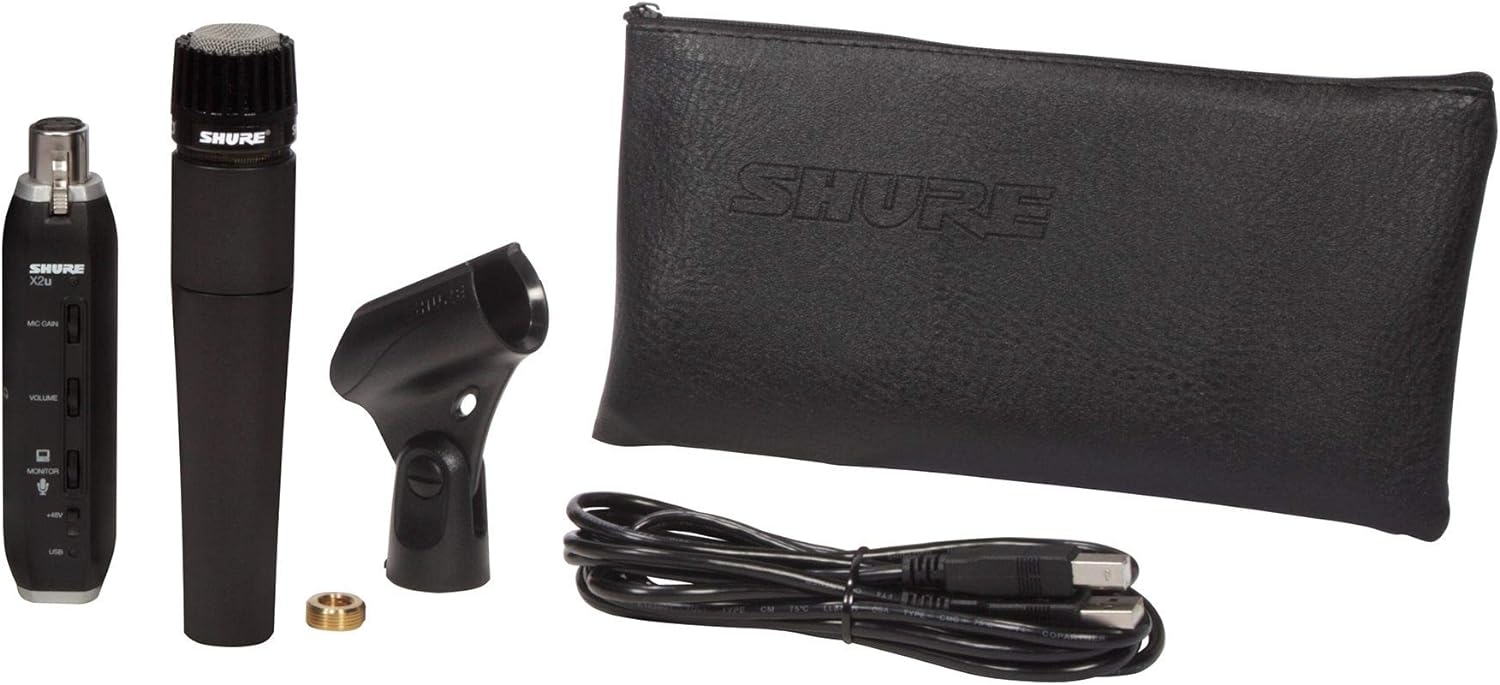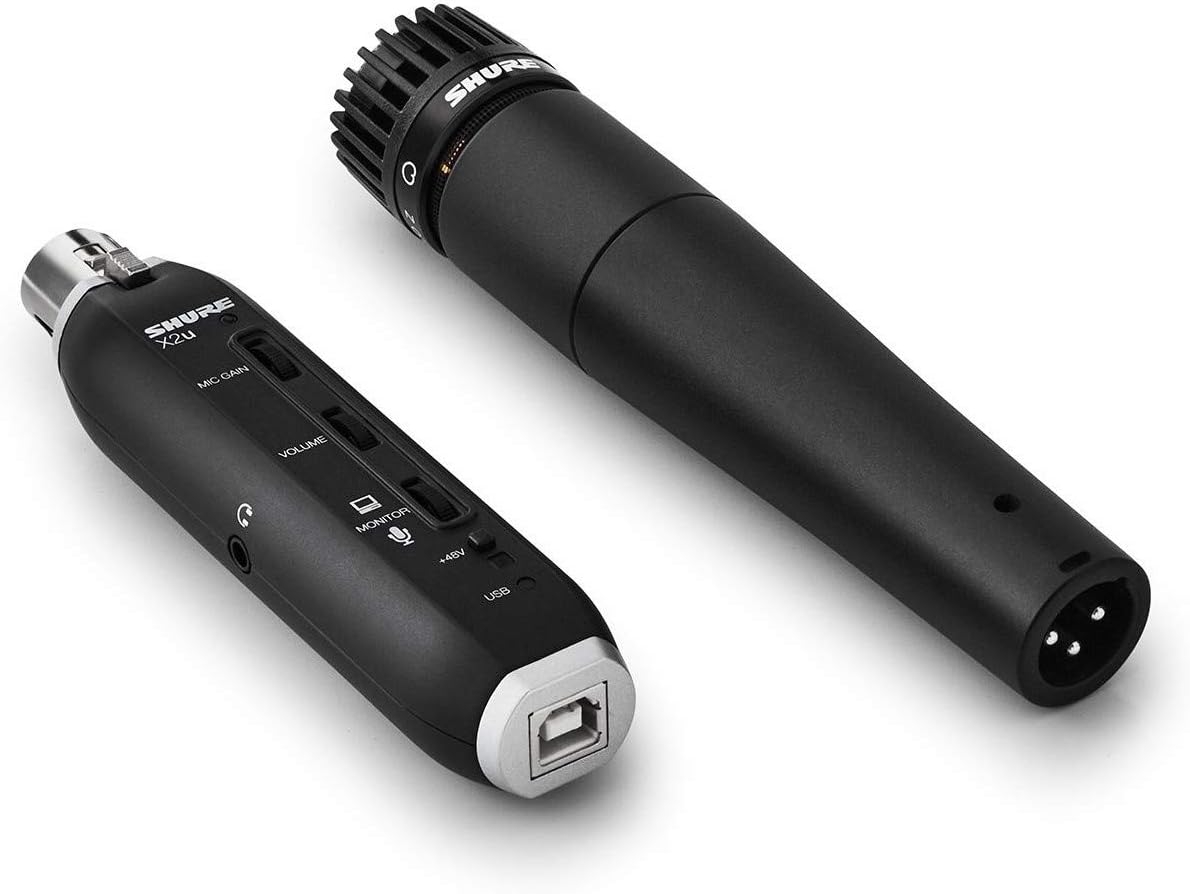The Shure SM57 is a legendary microphone revered for its versatility and durability. Let’s dive into its features, performance, and practical applications.
Design and Build
- Rugged Build: The SM57 boasts a robust construction, perfect for on-the-road use.
- Classic Look: Its iconic design is instantly recognizable, reflecting its long-standing reputation.
Performance
- Versatile Sound: Ideal for both instrument recording and vocals, offering clear, crisp sound reproduction.
- High Gain Before Feedback: Its cardioid pickup pattern excels in reducing unwanted noise.
Practical Use
- Live Performances: A staple on stages for decades, delivering consistent quality.
- Recording Studios: Adaptable for a range of instruments and voices, a studio must-have.
Microphone Pros
- Reliable and durable build
- Versatile sound reproduction
- High gain before feedback
- Suitable for various applications
Microphone Cons
- Lacks specific accessories in the package
- May require additional equipment for some setups
Conclusion
The Shure SM57 stands as a classic, versatile microphone suitable for diverse applications, known for its durability, adaptability, and superior sound quality.





Adam Nelson –
The Shure SM57 Dynamic Instrument Mic has completely blown me away with its exceptional performance and unparalleled versatility. This microphone has quickly become an indispensable tool in my audio setup, and I’m excited to share my five-star review.First and foremost, the sound quality captured by the SM57 is nothing short of phenomenal. Whether I’m recording vocals, instruments, or even amplifiers, this microphone consistently delivers a crisp, clear, and natural audio reproduction. The depth and clarity it captures have elevated my recordings to a whole new level, making each project a true auditory delight.The versatility of the SM57 is a game-changer. It seamlessly adapts to a wide range of applications, from studio recording to live performances. This microphone can handle virtually any instrument or sound source with precision and accuracy, ensuring that every nuance is captured in exquisite detail.But what truly sets the SM57 apart is its exceptional value. It’s not just a microphone; it’s an investment in unparalleled sound quality and performance. The durability and build quality of the SM57 ensure that it will be a reliable workhorse in my setup for years to come, making it an excellent long-term investment.Whether I’m miking up a guitar amp for a roaring rock sound or capturing delicate nuances in an acoustic performance, the SM57 delivers consistent and outstanding results. Its adaptability has made it a go-to choice in my microphone collection.In conclusion, the Shure SM57 Dynamic Instrument Mic is an absolute gem for anyone seeking top-tier sound quality, versatility, and lasting value. Its exceptional performance across various applications has left me thoroughly impressed, and I couldn’t be happier with my purchase. If you’re looking to take your audio recording and performance to the next level, the SM57 is an easy five-star recommendation. This microphone truly lives up to its reputation and then some!
Reina –
I bought this mic mostly for streaming, but it’s a fantastic general purpose desk microphone as well- with some caveats. Let me preface all of these caveats by saying that the sound quality you can get out of this mic completely overshadows any of the measures I had to take to do so, and it’s now my *only* microphone.1. You need to be close to the mic in order to get good sound and simultaneously good background noise rejection, and some people might find having a mic this close to their face disagreeable. This is not unique, however, to the SM57; it’s a pretty standard caveat of these types of mics.2. You will need an audio interface and very probably a preamp to get the most out of it. Personally, I’ve got it hooked up to a Scarlett Solo 3rd Gen, and that’s been doing absolutely fantastic, although you do need to crank the gain all the way up it seems in order to get strong enough signal. I have been told that a preamp would help, and I intend to get my hands on one sooner or later to make the most of this mic.Finding good mics is hard especially in the $75-200 range as there is a lot of abject garbage masquerading as “professional grade”. This makes things a lot simpler; the SM57 is one of the most widely used microphones in music and broadcasting for a reason: value and functionality. You can buy better microphones, but not without a dramatic jump in price. I’ll be hanging on to this mic for as long as I can, and based on the apparent build quality, that may very well be forever, barring exceptional acts of foolishness on my behalf.
Blaino –
Bought for playing harmonica. Easy to hold playing harp. Also good mic for amps and drums. Won’t pick up ambient noise as easily as a ball mic. It’s a tried and true device.
Michael F. McGonegal –
Using this for my home recording setup. Same mic we used in 1966 when I played in a band. Yeah, I’m dating myself! I know it’s an instrument mic, but I’ve always used it with a pop filter for vocals. I like its looks better than the SM-58, that’s all. As others have noted, it could use a preamp in front of the audio interface (Scarlett Solo). The Triton FETHead seemed to do the trick.
Alex –
Awesome mic. Industry legend, durable af, can double as a baton for self defense from how solid it’s built 10/10
jc –
As expected- the SM57 is industry standard for guitar. Easy to work with. Perfectly sized. Stylish looks. And exceptional sound quality.
BXC –
Of course the SM57 is great. It’s legendary. Kinda spendy though.
Amy Jimenez –
Very good mic for recording Bajo quinto.
Yann –
Pas le meilleur en particulier, mais le meilleur pour tout. 😉Pas grand chose à ajouter aux autres avis concernant le célèbrissime SM57. Un outil indestructible qui donne le ‘son du rock’.Depuis bientôt 60 ans, puisque c’est son âge, la technologie s’est améliorée et aujourd’hui, c’est loin d’être le meilleur micro pour capter une voix, une caisse claire, des percus, un ampli guitare ou encore des cuivres. Il en existe tout un tas plus adaptés à chacun de ces scénarios particuliers, chez plusieurs fabricants. Par contre, là ou le SM57 reste dans la course, c’est qu’il est encore l’un des rares micros utilisables dans TOUS ces cas. Et à chaque fois, il donnera un résultat parfaitement exploitable.À moins de craindre de se les faire tous voler, sonoriser un concert sans embarquer quelques SM57, c’est aimer se compliquer la vie à un niveau qui relève de la pathologie. Impossible de se planter complètement en le choisissant, et ceci quelle que soit la source. Donc une légende, oui, mais elle est méritée.
MauAsRoma –
Sbalorditivo questo Shure SM57Lo uso da pochissimi giorni. collegato a una Focusrite Scarlett 8i6 3G per amplificare delle chitarre acustiche con uscita audio su due monitor da studio semi professionali e devo ammettere che il risultato è davvero fantastico. Il suono è definito e non distorce mai nemmeno a volumi elevati. Non ha bisogno di tanto volume per farsi sentire. Mi riferisco all’uso con la chitarra, ma anche del cantato/parlato. Non puntate il mic sulla buca della chitarra ma verso il 12* tasto della tastiera, così il risultato sarà ok. Questo Shure se la cava egregiamente anche sul cantato, ve lo assicuro. Risponde benissimo e non altera assolutamente il suono originale della chitarra, anzi lo esalta dandogli il volume che merita. Non posso che consigliarlo a chi cerca un vero microfono e credo anche uno dei più venduti.